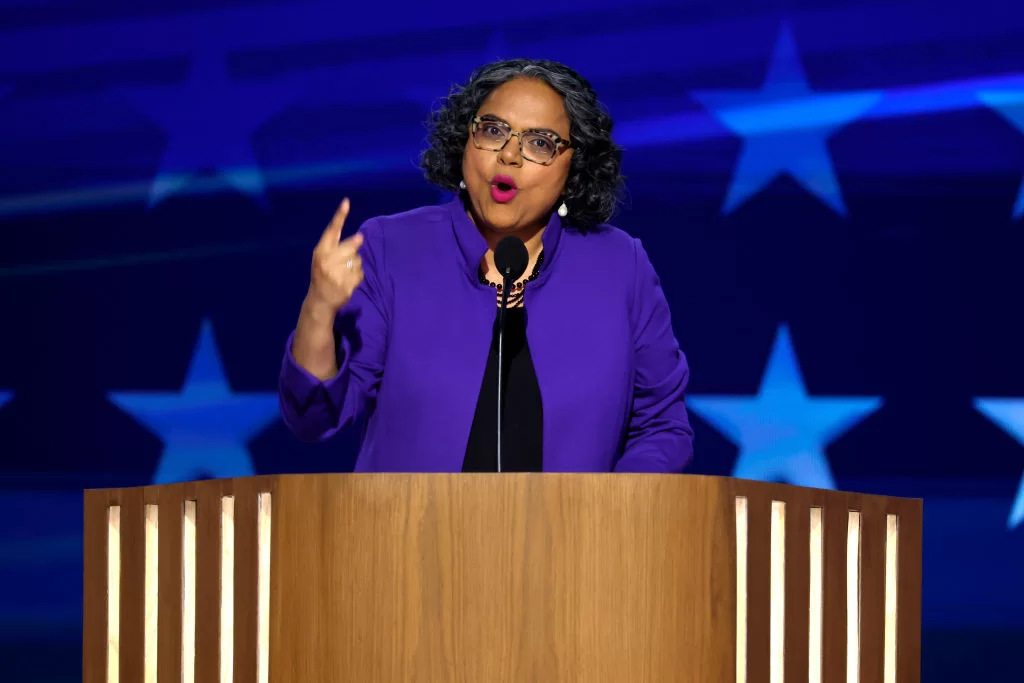- Thursday, May 22, 2025
In a candid conversation, Reproductive Freedom for All CEO Mini Timmaraju reflects on her family’s legacy, navigating tradition, and how Indian American women can build power through collective leadership and care.

By: Vibhuti Pathak
Mini Timmaraju, president and CEO of Reproductive Freedom for All, embodies a legacy of transformation—from a family line marked by traditional expectations to a personal journey rooted in choice, care, and collective leadership. As one of the leading Indian American women in politics, Timmaraju brings lived experience and strategic clarity to her work in reproductive rights advocacy.
Her story begins with her am’mam’ma—her maternal grandmother in India—who had eight pregnancies and seven children in a time before contraception. Her own mother broke from that pattern, choosing to raise a single child—Mini. And Mini herself adopted two children, shaping a family of her own making.
“It’s remarkable how family planning evolved in just three generations,” Timmaraju says, underscoring her belief in autonomy and access to reproductive choices.
View this post on Instagram
Now leading a national movement, Timmaraju’s commitment to reproductive freedom is both personal and political. “I want women today to have even more options,” she says, affirming her mission to protect and expand reproductive rights. At the helm of Reproductive Freedom for All (formerly NARAL), she isn’t just advocating for legal rights—she’s working to create sustainable structures of leadership.
In her view, the greatest challenge for Indian American women in leadership isn’t apathy—it’s access. “There are more of us than you see,” she insists. Many Indian American women are eager to lead but don’t know where or how to begin. The Trump era, marked by heightened immigration concerns and divisive rhetoric, slowed the momentum that had started to build. “That’s why mentorship matters now more than ever,” she adds.
Mentorship is not abstract for Timmaraju—it’s tactical. “I’ve tapped at least four women on the shoulder and said, ‘Come work for me,’” she says. She calls this leadership style “active inclusion,” a belief that those in power must deliberately create pathways for others, especially younger Indian American women navigating politics, policy, and public service.
Raised in a culturally rich yet traditionally bound household, Timmaraju has long walked the tightrope between ambition and expectation. After law school, her father—though proud of her achievements—placed a marriage ad in a local paper, assuming it was time for her to settle down. The ensuing fallout marked a pivotal moment where she chose her own path over conventional timelines.
View this post on Instagram
Despite her progressive career, Timmaraju remains deeply tied to Indian cultural values. When her father fell ill, she stepped away from a major campaign to care for her parents, welcoming them into her home. “They worried I was becoming too American,” she says, laughing. “Turns out I’m pretty traditional after all.” Her caregiving ethic reflects the collective responsibility she champions in her professional life.
This blend of personal experience and political vision informs how she leads. “I’ve always been a seeker of resources,” she shares, recalling how she sought therapy in college as a form of self-empowerment. Her leadership today continues in that spirit—encouraging others to use every available resource to thrive.
Timmaraju’s advocacy for Indian American mentorship is rooted in her upbringing. Her father, an engineer and labor rights activist in India, once quietly paid for another family’s daughter to attend school. “We weren’t wealthy,” she remembers, “but he believed in dharma—a duty to help others.” Her mother, too, exemplified foresight and care, choosing to return to India for postpartum support because of the lack of communal care in the U.S.
That concept of the “village” deeply influences Timmaraju’s belief in how women lead. “We need to build our own villages—not just for family, but for career and leadership,” she says. In a culture where Indian American women often carry multigenerational expectations, building intentional, supportive spaces becomes a revolutionary act.
She encourages women to “tap someone in”—not to wait for others to ask, but to extend opportunities and mentorship. “If you see potential, say something. Tell them. Invite them,” she urges. This mindset has led to real change, as seen in countless women she’s guided into advocacy, organizing, and politics.
Visibility, she insists, is essential. “Seeing people who looked like me doing important work made me believe I could do it too,” she says. Whether it’s engineering, medicine, or advocacy, spotlighting diverse Indian American stories expands what feels possible for the next generation.
Mini Timmaraju isn’t just leading a movement—she’s cultivating one. Her life reflects a powerful message: leadership rooted in community, identity, and intention can reshape the world—not just for Indian American women, but for everyone who believes in equity and freedom.